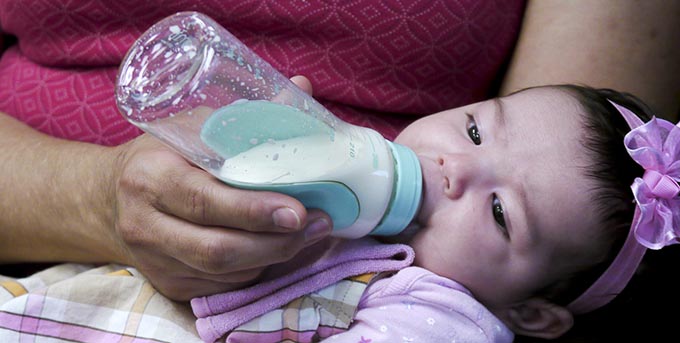When Abbott Pharmaceuticals recalled many of their products, the closure of their biggest production facility in the U.S., along with COVID-19-related supply chain issues, coalesced in a nightmare for parents: A nationwide baby formula shortage.
As parents scramble to find baby formula, health leaders are urging parents to communicate with their infants’ health care providers to ensure the babies’ nutritional requirements are met in a safe manner.
According to Matthew Kadish, MD, assistant professor in The University of New Mexico Department of Pediatrics, parents can first consider switching to another formula if one is readily available.
“Unless your baby is on a specific extensively hydrolyzed formula like Elecare or Alimentum, it is generally OK to switch to any available formula,” Kadish said.
If a child is older than six months and parents do not have access to any formula, he said parents can give their baby whole cow’s milk – but only for a brief time period.
“This is not ideal, but can help in a pinch,” Kadish said. “They should not have more than 24 ounces per day, and you should talk to your pediatrician about iron supplements if you have to give your infant cow’s milk.”
If a baby is old enough, parents might be considering experimenting with switching away from formula and over to solid foods. He said the earliest that babies can start solid foods is four months, but it is frequently recommended to wait until closer to six months.
“Parents will know when a baby is ready,” he said. “Like when they are able to sit with good head control, they open their mouth when you try to feed them, and they are able to use their tongue to swallow the food without difficulty – as opposed to immediately pushing it out with their tongue.”
Kadish added that it’s generally recommended to introduce one new food at a time over the course of a few days to monitor for any reactions, especially if there is a family history of food allergies.
As for what not to do, Kadish said parents should not create their own formula or water down the formula they have left.

We strongly advise against watering down formula or using homemade formula recipes since they can cause very serious nutritional imbalances.
“We strongly advise against watering down formula or using homemade formula recipes since they can cause very serious nutritional imbalances,” he said.
There is some good news on the horizon for hungry babies and their anxious parents: The Food and Drug Administration is working with the formula suppliers to resolve the shortage. In the meantime, Kadish advised parents to not panic-buy and stockpile formula.
“Parents should only buy at most a two-week supply at a time to help ease the shortage while production is getting back to normal,” Kadish said.
The Supplemental Nutrition for Women, Infants and Children program (WIC) – which supports the purchase of formula, among many other resources, for moms and families of young children – uses Gerber as its main supplier for baby formula orders and has maintained a steady supply throughout the shortage.
WIC participants struggling to find formula can contact the WIC program to identify or obtain additional sources of infant formula nearby.
